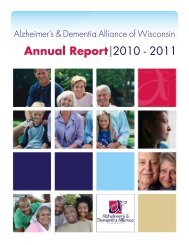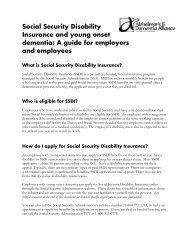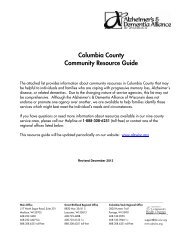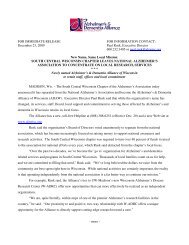Inside - Alzheimer's & Dementia Alliance of Wisconsin
Inside - Alzheimer's & Dementia Alliance of Wisconsin
Inside - Alzheimer's & Dementia Alliance of Wisconsin
You also want an ePaper? Increase the reach of your titles
YUMPU automatically turns print PDFs into web optimized ePapers that Google loves.
iscule,” said lead author Eric Widera,<br />
MD, a geriatrician at SFVAMC. “And<br />
yet when family members and caregivers<br />
are asked what’s important to them,<br />
finances are near the top <strong>of</strong> the list.<br />
“The literature tells us that financial<br />
incapacity occurs very early and very<br />
rapidly in Alzheimer’s disease and other<br />
dementias,” said Widera.<br />
This rapid progression <strong>of</strong> financial incapacity,<br />
said Widera, makes it “essential”<br />
that physicians proactively counsel<br />
patients and their families on financial<br />
planning “early in the disease, while the<br />
patient still has the capacity to make<br />
the decisions” that will allow trusted<br />
caregivers to take over finances.<br />
As a first step in financial planning, the<br />
authors recommend that early in the<br />
course <strong>of</strong> the disease the patient sign<br />
a durable power <strong>of</strong> attorney authorizing<br />
a family member or other trusted<br />
caregiver to make financial decisions on<br />
the patient’s behalf.<br />
Come to one <strong>of</strong> our Legal and Financial<br />
Planning Seminars this spring in Madison<br />
or Monroe. See page three for details.<br />
Moderate exercise improves<br />
memory in older people<br />
Source: Medical News Today - Just one<br />
year <strong>of</strong> moderate physical exercise in<br />
late adulthood can reverse shrinkage <strong>of</strong><br />
the brain’s hippocampus and improve<br />
spatial memory, said US researchers<br />
in a new study funded through the<br />
National Institute on Aging.<br />
The hippocampus is a significant part<br />
<strong>of</strong> the brain in humans and other<br />
mammals. It plays an important role in<br />
long term and other types <strong>of</strong> memory<br />
formation and spatial navigation.<br />
As we enter late adulthood, this part<br />
<strong>of</strong> the brain starts to shrink, leading<br />
to loss <strong>of</strong> memory and increased risk<br />
<strong>of</strong> dementia. The researchers found<br />
that aerobic exercise training increases<br />
the size <strong>of</strong> the anterior hippocampus,<br />
leading to improvements in spatial<br />
memory.<br />
This research shows “...that even moderate<br />
exercise for one year can increase<br />
the size <strong>of</strong> that structure. The brain at<br />
that stage remains modifiable.”<br />
Americans worry about getting<br />
Alzheimer’s<br />
Soutce: WebMD - American adults<br />
fear getting Alzheimer’s disease almost<br />
as much as they do getting cancer, a<br />
new survey shows.<br />
A survey <strong>of</strong> 1,007 adults by Harris<br />
Interactive for the MetLife Foundation<br />
finds that 41% <strong>of</strong> people fear cancer<br />
most, closely followed by Alzheimer’s<br />
disease at 31%.<br />
Currently, more than 5 million people<br />
have Alzheimer’s, and that number<br />
is expected to mushroom in coming<br />
years with the aging <strong>of</strong> the baby boom<br />
generation. Though a large number <strong>of</strong><br />
people fear getting Alzheimer’s, 62%<br />
<strong>of</strong> those surveyed say they know little<br />
or nothing about it, which may explain<br />
why only 18% <strong>of</strong> adults have developed<br />
a plan for care should they get the<br />
disease.<br />
An Alzheimer’s vaccine in a nasal<br />
spray?<br />
Source: ScienceDaily - Researchers <strong>of</strong><br />
Tel Aviv University’s Department <strong>of</strong><br />
Neurobiology are working on a nasallydelivered<br />
2-in-1 vaccine that promises<br />
to protect against both Alzheimer’s and<br />
stroke. The new vaccine repairs vascular<br />
damage in the brain by rounding up<br />
“troops” from the body’s own immune<br />
system.<br />
And in addition to its prophylactic effect,<br />
it can work even when Alzheimer’s<br />
symptoms are already present.<br />
“Using part <strong>of</strong> a drug that was previously<br />
tested as an influenza drug,<br />
we’ve managed to successfully induce<br />
an immune response against amyloid<br />
proteins in the blood vessels,” says Dr.<br />
Dan Frenkel, who collaborated on this<br />
project with Pr<strong>of</strong>. Howard L. Weiner<br />
<strong>of</strong> Brigham and Women’s Hospital,<br />
Harvard Medical School. The vaccine<br />
could be given to people who are at<br />
risk, those who show very early symptoms<br />
<strong>of</strong> these diseases, and those who<br />
have already suffered strokes to repair<br />
any vascular damage.<br />
High cholesterol and blood<br />
pressure in middle age tied to<br />
early memory problems<br />
Source: Medical News Today - Middleage<br />
men and women who have cardiovascular<br />
issues, such as high cholesterol<br />
and high blood pressure, may not only<br />
be at risk for heart disease, but for an<br />
increased risk <strong>of</strong> developing early cognitive<br />
and memory problems as well.<br />
For the study, 3,486 men and 1,341<br />
women with an average age <strong>of</strong> 55 underwent<br />
cognitive tests three times over<br />
10 years. “Our findings contribute to<br />
the mounting evidence for the role <strong>of</strong><br />
cardiovascular risk factors, such as high<br />
cholesterol and blood pressure, contributing<br />
to cognitive problems starting<br />
in middle age,” said study author Sara<br />
Kaffashian, MSc, with INSERM, the<br />
French National Institute <strong>of</strong> Health<br />
& Medical Research in Paris. “The<br />
study further demonstrates how these<br />
heart disease risk factors can contribute<br />
to cognitive decline over a 10 year<br />
period.”<br />
Alzheimer’s & <strong>Dementia</strong> <strong>Alliance</strong> <strong>of</strong> <strong>Wisconsin</strong> • 5








